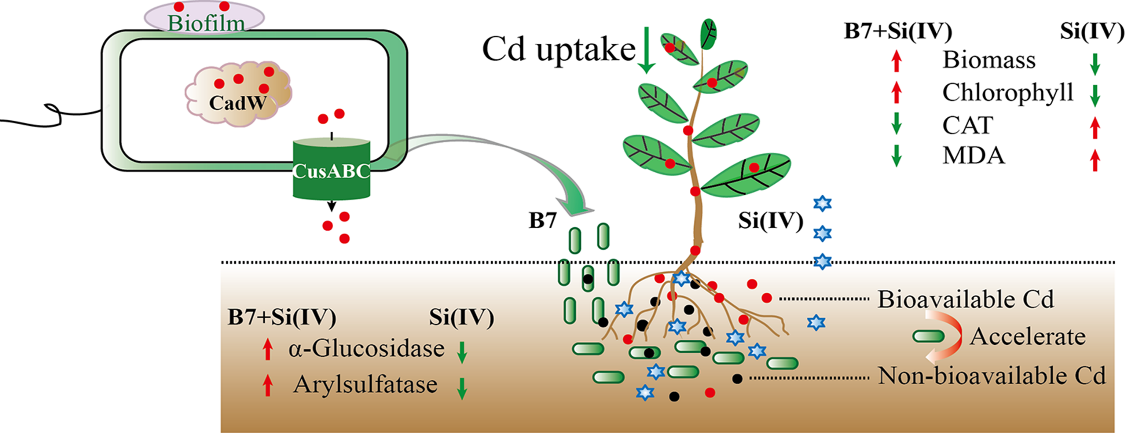我校发布新型微生物菌剂钝化重金属镉及增强土壤健康研究成果
南湖新闻网讯(通讯员:史凯祥)近日,我校生命科学技术学院、农业微生物学国家重点实验室王革娇教授领衔的环境微生物课题组在国际学术期刊Journal of Hazardous Materials发表了关于假单胞菌菌剂对重金属镉污染钝化的最新▃研究成果,阐明了假单胞菌菌剂通过新型镉结合蛋白去除镉的分子机制及菌剂对促进植物和土壤健康与降低镉含量的积极作用。

该课题组从镉污染农田土中分离鉴定了一株镉抗性细菌假单胞菌B7,该细菌培养后可完全去除溶液中的镉离子。采用差异ζ 蛋白质组学分析技术,镉离子能够显著激活一种碳酸酐酶的表达,命名为CadW。通过体内与体外实验证明了该蛋白能够提高细菌对镉离子的抗性,且能够与镉离子特异性结合从而将镉离子固定在细胞内部,其中123位的组氨酸为其保守的镉离子结合位点。将该微生物菌剂结合化学修复剂硅酸盐应用于镉污染白菜盆栽实验中,发现该微生物菌剂结合硅酸盐可以有效的钝化土壤中的镉,减少植物对镉离子的吸收,使白菜地上部分镉含量下降了34%,达到了安全可食用范围。植物酶活与土壤酶活分析,发现该混合菌剂可以缓解化学修复剂硅酸盐对植物和土壤的不利影响,具有增强植物与土壤健康的作用。
该课题组阐明了细菌中一种新型的镉钝化机制,从酶学角度探究了微生物对恢复土壤和植物健康的重要作用。其研究结果为理解微生物介导的环境中镉钝化迈出了重要的一步,为微生物菌剂在镉污染修复中的作用提供了♀重要理论价值和应用潜力。
华中农业大学生命科学技术学院武士娟博士为第一作者、王革娇教授与史凯祥副研究员为共同通讯作者,该工作得到国家自然科学基金的资助。
英文摘要:
In this study, we isolated a highly cadmium (Cd)-resistant bacterium,Pseudomonassp. B7, which immobilized 100% Cd(II) from medium. Culturing strain B7 with Cd(II) led to the change of functional groups, mediating extracellular Cd(II) adsorption. Proteomics showed that a carbonic anhydrase, CadW, was upregulated with Cd(II). CadW expression inEscherichia coliconferred resistance to Cd(II) and increased intracellular Cd(II) accumulation. Fluorescence assays demonstrated that CadW binds Cd(II) and the His123 residue affected Cd(II) binding activity, indicating that CadW participates in intracellular Cd(II) sequestration. Chinese cabbage pot experiments were performed using strain B7 and silicate [Si(IV)]. Compared with the control, Cd content in aboveground parts significantly decreased by 21.3%, 29.4% and 32.9%, and nonbioavailable Cd in soil significantly increased by 129.4%, 45.0% and 148.7% in B7, Si(IV) and B7+Si(IV) treatments, respectively. The application of Si(IV) alone reduced chlorophyll content by 20.8% and arylsulfatase activity in soil by 33.9%, and increased malonaldehyde activity by 15.0%. The application of strain B7 alleviated the negative effect of Si(IV) on plant and soil enzymes. Overall, application of Si(IV) is most conducive to the decreased Cd accumulation in plant, and strain B7 is beneficial to maintaining soil and plant health.
全文链接:https://www.sciencedirect.com/science/article/pii/S0304389421028880
审核人:王革娇
未经允许不得转载:二九年华大学门户 » 我校发布新型微生物菌剂钝化重金属镉及增强土壤健康研究成果
相关推荐
- 学校就疫情防控期间教育教学工作召开专题会议
- 【战“疫”快报】学校党员为疫情防控工作积极捐款
- 河南省宝丰县委书记许红兵一行来校推进校地合作
- 教育部党组第七巡视组巡视华中农业大学党委工作动员会召开
- 学校召开8月学位评定委员会会议
- 学校致在豫华农学子的倡议书
- 我校持续推进校园电动车秩序综合治理
- 学校赴塔里木大学推进对口支援工作
- 咸宁职业技术学院党委书记王继成来校调研交流
- 跨年狂欢◆会:师生同台演绎 精彩汇聚狮山
- 我校志愿者受邀参加央视2021年五四青年节特¤别节目
- 刘慧鑫教授做客我校“整合生物学前沿”论坛
- “大手牵小手” 为山区孩子们打开一扇科技的窗
- 动科动医学院:“五新一严”推进主题教育
- 严建兵到研究生院调研新学期工作
- 我校富营养化与面源污染控制团队取得新进展
- 我校学者在研究中回答不同水稻生产系统如何实现固碳减排
- 学校与红安县对接 “乡村振兴荆楚行”
- 校医院:让党徽在疫情防控一线熠熠闪耀
- 学校召开2020年度领导班子民主生活会
新闻公告
- 生科院:“红色导师”引领学子追光逐梦 01-06
- 我校5项课题获全国农业教指委研究课题立项 01-05
- 学校举办第二届教师教学创新大赛 01-05
- 校领导班子召开2022年第1次工作调度会 01-05
- “金种子”课程:播种希望 畅游于知识海洋 01-04
- 我校3人入选2021年度“洪山好人” 01-04
- 学校召开集体廉政谈话会议 01-04
高考招生
- 2017年华中农业大学普通本科招生章程 08-05
- 2018年华中农业大学普通本科招生章程 08-05
- 华中农业大学2015年全日制普通本科招@生章程 08-05
- 华中农业大学普通本科招生章程(2016年) 08-05
- 华中农业大学2013年全日制普通本科招生章程 08-05
- 华中农业大学2014年全日制普通本科招生章程 08-05
- 华中农业大学2012年全日制普通本科招生章程 08-05
- 华中农业大学2008年全日制普通本科招生章程 08-05
- 华中农业大学2009年全日制普通本科招生章程 08-05
- 华中农业大学2007年全日制普通本科招生章程 08-05
